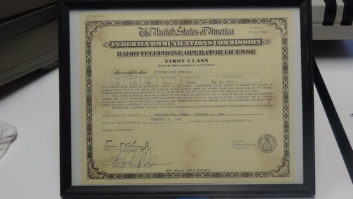Despite the request from a Texas licensee who said the commission acted with bias and violated his Fifth Amendment right to equal protection, the Federal Communications Commission denied the request of Roy E. Henderson to reinstate the license of KROY(FM) in Palacios, Texas.
In November 2017, the Audio Division of the Media Bureau noted that the station’s license automatically expired under the rules spelled out in the Communications Act. According to the FCC, From December 2009 to March 2014, KROY either was silent or operated sporadically with unauthorized facilities.
[Read: Engineer Challenges FCC’s Rubber-stamp of a Licensee’s Applications]
It was back in 2007 that the station’s original antenna tower was dismantled, and the station remained silent from October 2007 to October 2008 pursuant to two STAs. After that, the station received two additional STAs to operate at an interim site, the last of which expired on Dec. 25, 2009. At that point, the Media Bureau reported, the station lacked commission authority to operate anywhere other than the original dismantled site.
Yet, according to the bureau, Henderson continued to operate the station at the second site until March 2012. After that point, the station went silent for nearly a year, operated without authority for additional periods of time, and then filed a license for a new permanent site in March 2014.
According to the Media Bureau, the station’s license outright expired on Jan. 11, 2017, due to a failure to transmit a broadcast signal with 12 consecutive months. “[F]or over four years … the station was either silent or engaged in unauthorized operations,” said the report summary.
Henderson submitted several arguments in response to the Media Bureau’s decision, saying that the cancellation of the station’s license was inconsistent with commission’s practice of accepting late-filed renewal applications, that FCC staff violated the general principles of agency bias, that the agency misapplied sections of the Communications Act by not reinstating the license for reasons of equity and fairness, and that the FCC violated his Fifth Amendment right to equal protection, among other issues.
The FCC dismissed all those arguments in its final ruling. Among other reasons, the commission said it only exercises discretion regarding cancelled licenses when the failure to transmit a broadcast signal for 12 consecutive months is due to compelling circumstances beyond the licensee’s control.
“The commission has consistently declined to exercise its … discretion when, as here, station silence is the result of a licensee’s own inaction and/or exercise of business judgment,” the FCC said.
The commission affirmed the Media Bureau’s earlier decision and denied Henderson’s application for review due to what it called his “failure to operate with authorized facilities for over four years.”












